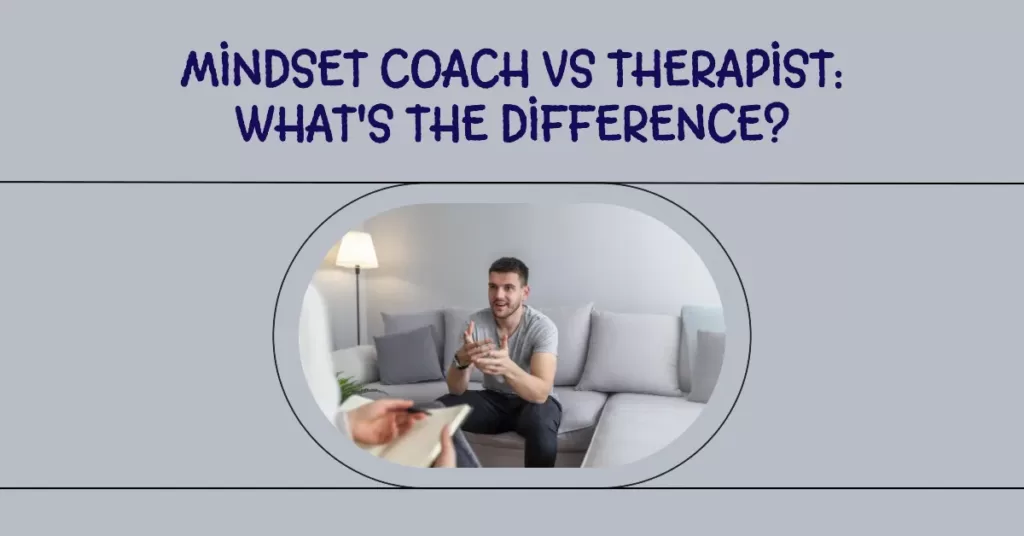Are you feeling stuck in life, unable to make progress toward your goals? Do you find yourself struggling with negative thoughts and emotions that hold you back from achieving success? You may be wondering whether a mindset coach or a therapist can help you overcome these obstacles.
Both mindset coaches and therapists can provide valuable guidance and support on your journey toward personal growth. However, it’s important to understand the differences between their approaches and techniques, so that you can choose the right professional for your specific needs. In this article, we’ll explore the roles of mindset coaches and therapists, as well as the ways in which they differ. By understanding these distinctions, you’ll be better equipped to make an informed decision about which type of professional is best suited to help you achieve your goals and live a fulfilling life of freedom.
Table of Contents
Key Takeaways
- Mindset coaching focuses on positive thinking patterns and identifying limiting beliefs, while therapy is dedicated to diagnosing and treating mental health disorders with evidence-based techniques.
- Mindset coaching is geared toward individuals without severe mental health issues, while therapy is recommended for those with more severe or complex conditions and may involve medication as part of the treatment plan.
- Combining mindset coaching and therapy can lead to a holistic approach addressing emotional healing and personal growth, with an individualized approach tailored to specific needs.
- When choosing between mindset coaching and therapy, consider the support and guidance needed for making positive changes, with a therapist being best for specific mental health issues and a mindset coach being more suitable for developing a growth mindset and overcoming limiting beliefs.
Understanding the Role of a Mindset Coach
Let’s dive into the role of a mindset coach, who can help boost self-confidence and improve mental clarity. The job of a mindset coach is to work with people on their thought processes and help them develop positive thinking patterns that lead to success.
A mindset coach will not diagnose or treat any mental health conditions. Instead, they will focus on helping you set attainable goals and develop strategies for reaching them. They can assist you in identifying limiting beliefs that may be holding you back from achieving your full potential. In essence, a mindset coach is there to provide guidance and support as you navigate through life’s challenges.
The goal of working with a mindset coach is to create lasting change in your life by rewiring your thought processes. You’ll learn how to identify negative patterns that are holding you back, replace them with more empowering ones, and ultimately achieve greater success in all areas of your life. Working with a mindset coach involves setting specific goals and developing an action plan to achieve them.
If you’re looking for someone to help you boost your confidence and improve your mental clarity, consider working with a mindset coach. They’ll help you identify limiting beliefs that are holding you back from achieving your goals while providing guidance and support along the way. Remember: positive change is possible when we believe in ourselves and take action toward our dreams!
Understanding the Role of a Therapist

As you delve deeper into the role of a therapist, you’ll discover an individual who is dedicated to helping you diagnose and treat mental health disorders. With evidence-based techniques for symptom management, your therapist will work with you to create a plan that’s tailored to your specific needs. Whether it’s providing a safe and supportive space for exploration or offering guidance on how to cope with life’s challenges, your therapist is there to help you achieve your goals and live the life you deserve.
Diagnosing and Treating Mental Health Disorders
You may be wondering how mindset coaches and therapists differ in their approach to diagnosing and treating mental health disorders. While both professionals work on improving your mental wellbeing, there are some key differences in the way they go about it. Here are a few ways mindset coaches and therapists differ when it comes to diagnosing and treating mental health:
- Mindset coaches focus on personal growth and empowerment rather than diagnosing or treating disorders.
- Therapists are licensed professionals who diagnose and treat mental health disorders using evidence-based techniques.
- Mindset coaching is often geared toward individuals who do not have severe mental health issues.
- Therapy is typically recommended for those with more severe or complex conditions that require medical intervention.
- A therapist may prescribe medication as part of their treatment plan, while a mindset coach would not.
Remember that seeking help from either a therapist or mindset coach is a positive step toward improving your overall wellbeing. Whether you need therapy or coaching depends on your specific needs and goals. Keep an open mind, be honest with yourself about what you need, and trust the process of self-discovery. With the right guidance, you can overcome any obstacles standing between you and living a life of freedom and fulfillment.
Evidence-Based Techniques for Symptom Management
Imagine finding relief from your symptoms by utilizing evidence-based techniques that have been proven effective in managing mental health. These techniques have been developed through years of research and practice, and can help you take control of your life and move forward with confidence. Whether you’re struggling with anxiety, depression, or other mental health issues, these techniques can provide the tools you need to manage your symptoms and improve your overall wellbeing.
One such technique is cognitive-behavioral therapy (CBT), which focuses on changing negative thought patterns and behaviors that contribute to mental health problems. Through CBT, you’ll learn how to identify negative thoughts and replace them with more positive ones, as well as develop coping strategies for managing difficult emotions. Another technique is mindfulness meditation, which involves focusing on the present moment without judgment or distraction. This can help reduce stress and anxiety while increasing feelings of calmness and relaxation. By incorporating evidence-based techniques into your daily routine, you can take charge of your mental health and start living the life you deserve.
Providing a Safe and Supportive Space for Exploration
When seeking help for mental health, it’s essential to find a therapist who can provide you with a safe and supportive space to explore your thoughts and feelings. A good therapist will not judge or criticize you but rather assist you in identifying the root cause of your problems. They will listen attentively, ask relevant questions, and offer guidance that is tailored to your unique needs.
A safe therapeutic environment allows you to be vulnerable without fear of judgment or rejection. You can let go of any emotional baggage that may be weighing you down and gain valuable insights into yourself. With the right support, you’ll develop the strength and resilience needed to overcome any obstacle life throws at you.
Remember: taking care of your mental health is crucial for living a fulfilling life full of joy and freedom!
Differences in Approach and Techniques

As a mindset coach, I’ll show you how to sharpen your mental saw and approach life with a more positive attitude, whereas a therapist will help you untangle the knots in your mind so that you can overcome past traumas and move forward. While our end goals may be similar – helping you live a better life – our approaches and techniques differ greatly.
One key difference between mindset coaching and therapy is the focus on the present versus the past. Mindset coaches tend to focus on the here and now, helping you identify areas where you may be getting stuck and providing strategies to shift your perspective. Therapists, on the other hand, often delve into past experiences to uncover patterns or triggers that may be impacting your current state of mind.
Another notable difference is in our communication styles. As a mindset coach, I take on an empowering role by asking open-ended questions that encourage introspection and self-discovery. By doing so, I help guide clients toward their own realizations and solutions. Alternatively, therapists often take on more of an authoritative role by providing guidance or direction through structured sessions.
There are differences in technique when it comes to addressing negative thought patterns or behaviors. Coaches might use visualization exercises or affirmations as part of their strategy for shifting negative thinking into positive action-taking. Therapists may use cognitive-behavioral therapy (CBT), exposure therapy or other therapeutic modalities to address specific issues like anxiety disorders.
So while both coaching and therapy can have transformative impacts on one’s life, understanding these differences can help clarify which approach might be best suited for individual needs at different points in time.
| Mindset Coach | Therapist |
|---|---|
| Focuses on present | May delve into past experiences |
| Empowering communication style | Authoritative communication style |
| Uses visualization exercises/affirmations | Uses CBT/exposure therapy |
| Helps shift negative thinking into positive action-taking | Addresses specific issues like anxiety disorders |
| Encourages introspection and self-discovery | Provides guidance or direction through structured sessions |
Choosing the Right Professional for Your Needs
To find the right professional for your needs, it’s important to consider what kind of support and guidance you’re seeking in order to make a positive change in your life. If you are struggling with a specific mental health issue such as depression or anxiety, a therapist may be the best option for you. They can provide evidence-based treatments and help you learn coping skills to manage symptoms.
On the other hand, if you are looking to develop a growth mindset and overcome limiting beliefs that are holding you back from achieving your goals, a mindset coach may be more suitable. A mindset coach can help you identify negative thought patterns and replace them with positive ones, while also providing accountability and support as you work toward your aspirations.
It’s important to note that both therapists and mindset coaches can provide valuable support for personal growth and development. The key is determining which approach aligns best with your current needs and goals. Consider factors such as cost, availability, qualifications, and personal preferences when making this decision.
Remember that seeking support from either professional is an act of self-care and empowerment. By taking steps toward improving your mental health or achieving personal goals, you are creating space for greater freedom in all aspects of your life. Trust yourself to make the right decision for your unique journey toward happiness and fulfillment.
Combining Mindset Coaching and Therapy
Like a chef combining different ingredients to create a delicious dish, blending mindset coaching and therapy can lead to a holistic approach that addresses both emotional healing and personal growth. While mindset coaching focuses on helping you achieve your goals by identifying limiting beliefs and creating positive thinking patterns, therapy deals with deeper emotional issues that may require professional intervention. Combining these two approaches can help you gain clarity about your thoughts, emotions, and behaviors while providing you with the tools to overcome obstacles.
When you work with both a mindset coach and therapist simultaneously, you can benefit from their respective areas of expertise. A therapist will help you identify negative thought patterns or trauma that may be holding you back in life, while the mindset coach will help shift those perspectives into more positive ones. By addressing past traumas in therapy sessions, it becomes easier to identify what needs changing in your current thought processes. Mindset coaching will then help reframe these thoughts into empowering ones that allow for personal growth.
The beauty of this combination is that it allows for an individualized approach tailored specifically to your needs. Depending on the severity of your issues or goals, the amount of time spent with each professional varies. The therapist helps heal past wounds while creating coping mechanisms for future difficulties; meanwhile, the coach provides guidance on achieving long-term goals by working through any self-limiting beliefs present.
Blending mindset coaching and therapy is an excellent way to take control of your mental health journey truly. It provides a comprehensive approach to address not only emotional healing but also personal growth. Remember that everyone’s path is different; therefore, finding professionals who are willing to work together toward achieving common goals is essential for success in this process!




